7101ICT Professional Issues: Ethical Analysis & Decision in IT
VerifiedAdded on 2023/04/08
|20
|5522
|343
Report
AI Summary
This report analyzes ethical dilemmas in the IT sector using the Ethical Decision Model (EDM), focusing on legal, professional, employment, social, personal, and intrinsic factors. It explores issues like privacy breaches, conflicts of interest, and biases in employment. The report also reflects on the importance of ethical conduct for IT professionals, covering technology ethics, the role of the ethical technologist, habits of effective technologists, the ACS Code of Professional Conduct, and ethical issues in the information age. The analysis includes prioritization of factors, decision-making processes, and discussion of findings, concluding with reflections on learning from the course, particularly regarding AI and human potential.
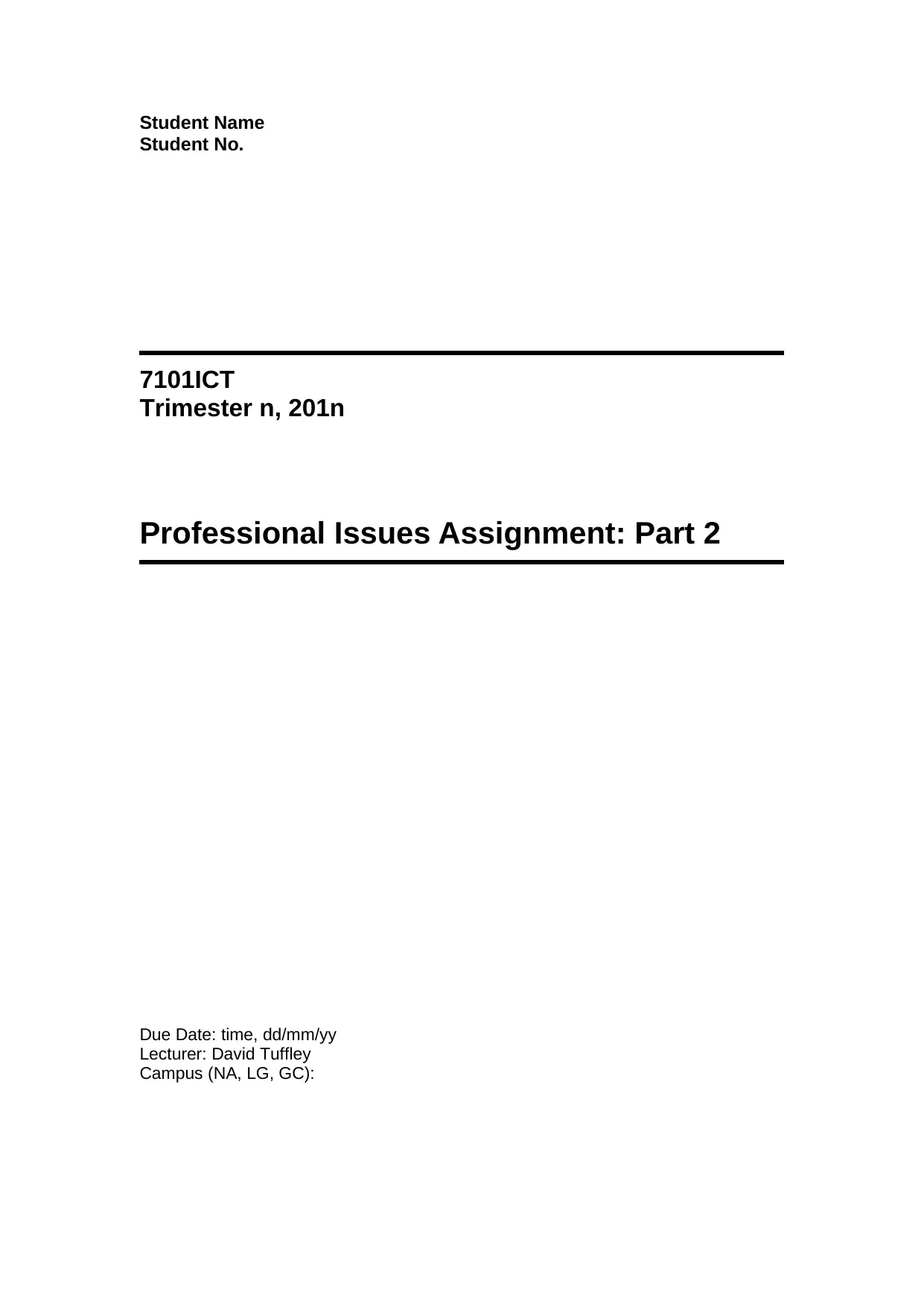
Student Name
Student No.
7101ICT
Trimester n, 201n
Professional Issues Assignment: Part 2
Due Date: time, dd/mm/yy
Lecturer: David Tuffley
Campus (NA, LG, GC):
Student No.
7101ICT
Trimester n, 201n
Professional Issues Assignment: Part 2
Due Date: time, dd/mm/yy
Lecturer: David Tuffley
Campus (NA, LG, GC):
Paraphrase This Document
Need a fresh take? Get an instant paraphrase of this document with our AI Paraphraser
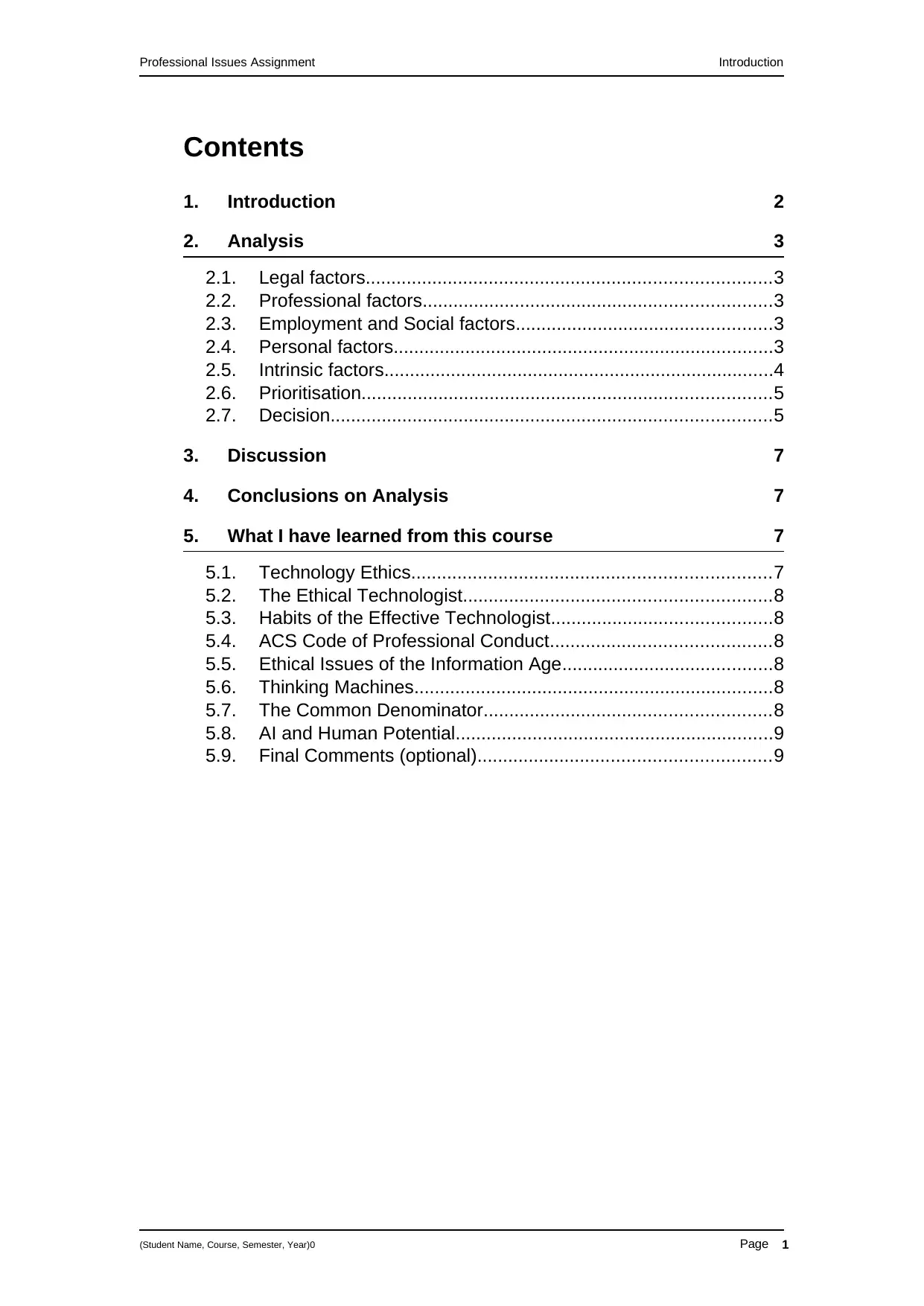
Professional Issues Assignment Introduction
Contents
1. Introduction 2
2. Analysis 3
2.1. Legal factors...............................................................................3
2.2. Professional factors....................................................................3
2.3. Employment and Social factors..................................................3
2.4. Personal factors..........................................................................3
2.5. Intrinsic factors............................................................................4
2.6. Prioritisation................................................................................5
2.7. Decision......................................................................................5
3. Discussion 7
4. Conclusions on Analysis 7
5. What I have learned from this course 7
5.1. Technology Ethics......................................................................7
5.2. The Ethical Technologist............................................................8
5.3. Habits of the Effective Technologist...........................................8
5.4. ACS Code of Professional Conduct...........................................8
5.5. Ethical Issues of the Information Age.........................................8
5.6. Thinking Machines......................................................................8
5.7. The Common Denominator........................................................8
5.8. AI and Human Potential..............................................................9
5.9. Final Comments (optional).........................................................9
(Student Name, Course, Semester, Year)0 Page 1
Contents
1. Introduction 2
2. Analysis 3
2.1. Legal factors...............................................................................3
2.2. Professional factors....................................................................3
2.3. Employment and Social factors..................................................3
2.4. Personal factors..........................................................................3
2.5. Intrinsic factors............................................................................4
2.6. Prioritisation................................................................................5
2.7. Decision......................................................................................5
3. Discussion 7
4. Conclusions on Analysis 7
5. What I have learned from this course 7
5.1. Technology Ethics......................................................................7
5.2. The Ethical Technologist............................................................8
5.3. Habits of the Effective Technologist...........................................8
5.4. ACS Code of Professional Conduct...........................................8
5.5. Ethical Issues of the Information Age.........................................8
5.6. Thinking Machines......................................................................8
5.7. The Common Denominator........................................................8
5.8. AI and Human Potential..............................................................9
5.9. Final Comments (optional).........................................................9
(Student Name, Course, Semester, Year)0 Page 1
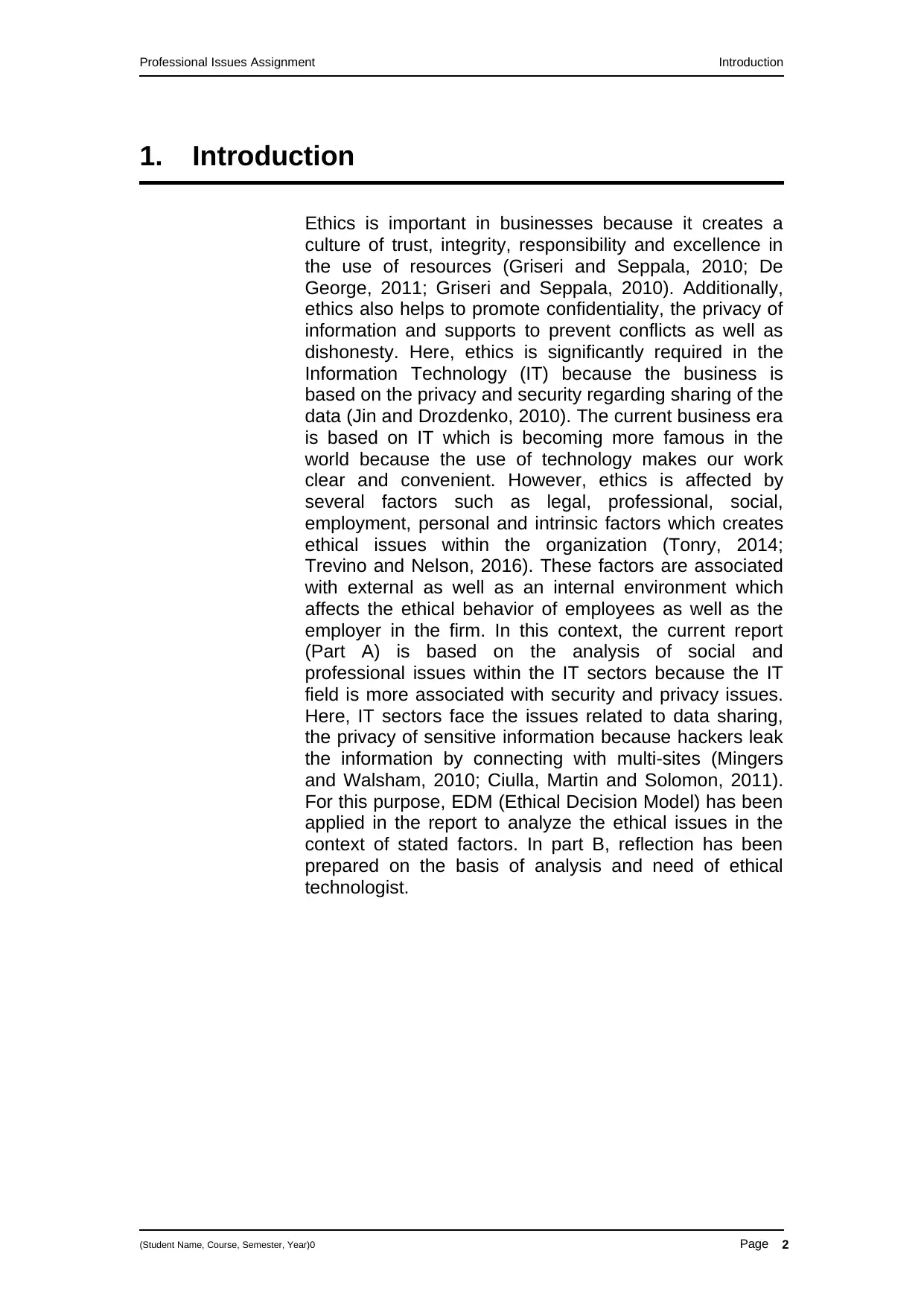
Professional Issues Assignment Introduction
1. Introduction
Ethics is important in businesses because it creates a
culture of trust, integrity, responsibility and excellence in
the use of resources (Griseri and Seppala, 2010; De
George, 2011; Griseri and Seppala, 2010). Additionally,
ethics also helps to promote confidentiality, the privacy of
information and supports to prevent conflicts as well as
dishonesty. Here, ethics is significantly required in the
Information Technology (IT) because the business is
based on the privacy and security regarding sharing of the
data (Jin and Drozdenko, 2010). The current business era
is based on IT which is becoming more famous in the
world because the use of technology makes our work
clear and convenient. However, ethics is affected by
several factors such as legal, professional, social,
employment, personal and intrinsic factors which creates
ethical issues within the organization (Tonry, 2014;
Trevino and Nelson, 2016). These factors are associated
with external as well as an internal environment which
affects the ethical behavior of employees as well as the
employer in the firm. In this context, the current report
(Part A) is based on the analysis of social and
professional issues within the IT sectors because the IT
field is more associated with security and privacy issues.
Here, IT sectors face the issues related to data sharing,
the privacy of sensitive information because hackers leak
the information by connecting with multi-sites (Mingers
and Walsham, 2010; Ciulla, Martin and Solomon, 2011).
For this purpose, EDM (Ethical Decision Model) has been
applied in the report to analyze the ethical issues in the
context of stated factors. In part B, reflection has been
prepared on the basis of analysis and need of ethical
technologist.
(Student Name, Course, Semester, Year)0 Page 2
1. Introduction
Ethics is important in businesses because it creates a
culture of trust, integrity, responsibility and excellence in
the use of resources (Griseri and Seppala, 2010; De
George, 2011; Griseri and Seppala, 2010). Additionally,
ethics also helps to promote confidentiality, the privacy of
information and supports to prevent conflicts as well as
dishonesty. Here, ethics is significantly required in the
Information Technology (IT) because the business is
based on the privacy and security regarding sharing of the
data (Jin and Drozdenko, 2010). The current business era
is based on IT which is becoming more famous in the
world because the use of technology makes our work
clear and convenient. However, ethics is affected by
several factors such as legal, professional, social,
employment, personal and intrinsic factors which creates
ethical issues within the organization (Tonry, 2014;
Trevino and Nelson, 2016). These factors are associated
with external as well as an internal environment which
affects the ethical behavior of employees as well as the
employer in the firm. In this context, the current report
(Part A) is based on the analysis of social and
professional issues within the IT sectors because the IT
field is more associated with security and privacy issues.
Here, IT sectors face the issues related to data sharing,
the privacy of sensitive information because hackers leak
the information by connecting with multi-sites (Mingers
and Walsham, 2010; Ciulla, Martin and Solomon, 2011).
For this purpose, EDM (Ethical Decision Model) has been
applied in the report to analyze the ethical issues in the
context of stated factors. In part B, reflection has been
prepared on the basis of analysis and need of ethical
technologist.
(Student Name, Course, Semester, Year)0 Page 2
⊘ This is a preview!⊘
Do you want full access?
Subscribe today to unlock all pages.

Trusted by 1+ million students worldwide
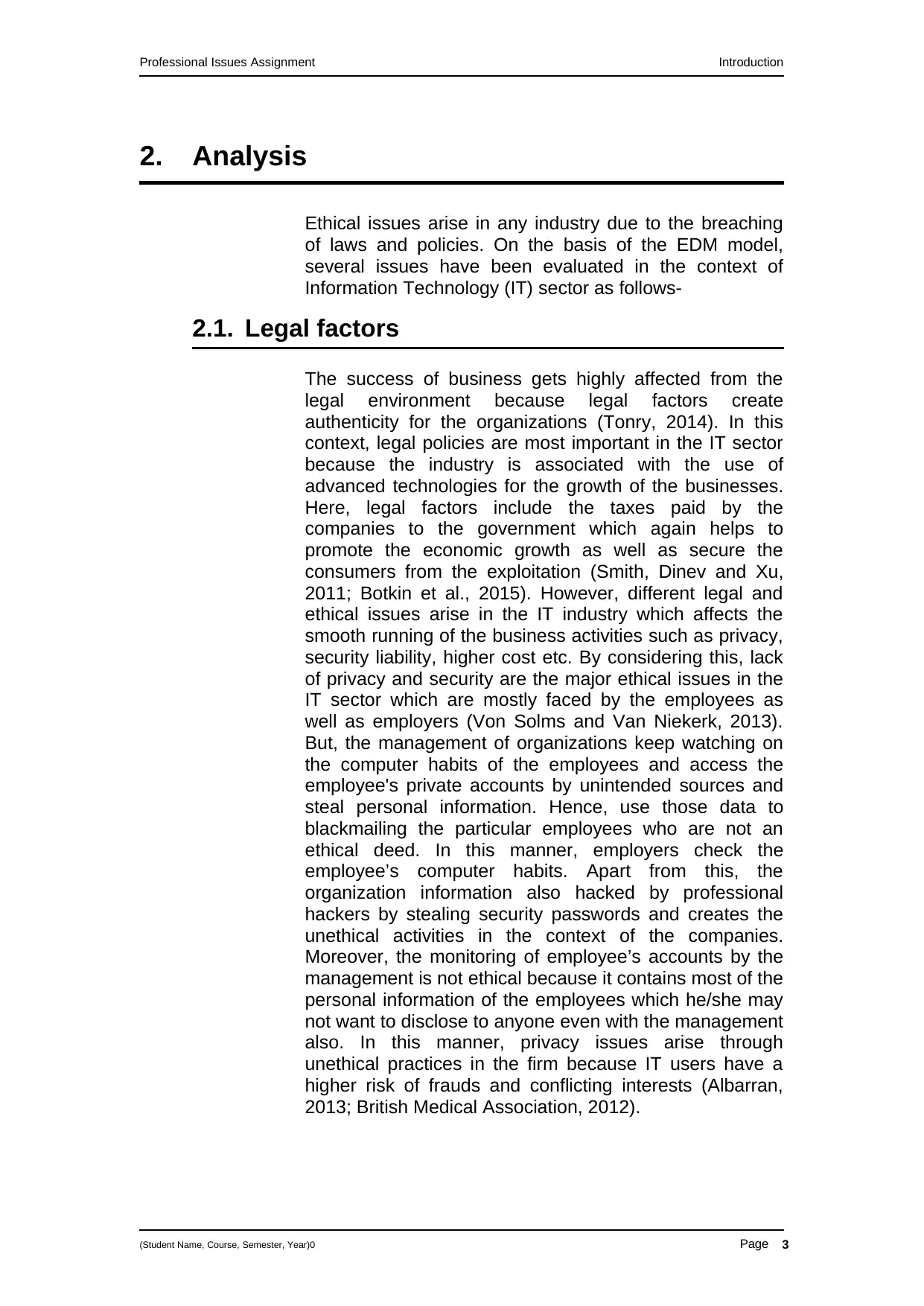
Professional Issues Assignment Introduction
2. Analysis
Ethical issues arise in any industry due to the breaching
of laws and policies. On the basis of the EDM model,
several issues have been evaluated in the context of
Information Technology (IT) sector as follows-
2.1. Legal factors
The success of business gets highly affected from the
legal environment because legal factors create
authenticity for the organizations (Tonry, 2014). In this
context, legal policies are most important in the IT sector
because the industry is associated with the use of
advanced technologies for the growth of the businesses.
Here, legal factors include the taxes paid by the
companies to the government which again helps to
promote the economic growth as well as secure the
consumers from the exploitation (Smith, Dinev and Xu,
2011; Botkin et al., 2015). However, different legal and
ethical issues arise in the IT industry which affects the
smooth running of the business activities such as privacy,
security liability, higher cost etc. By considering this, lack
of privacy and security are the major ethical issues in the
IT sector which are mostly faced by the employees as
well as employers (Von Solms and Van Niekerk, 2013).
But, the management of organizations keep watching on
the computer habits of the employees and access the
employee's private accounts by unintended sources and
steal personal information. Hence, use those data to
blackmailing the particular employees who are not an
ethical deed. In this manner, employers check the
employee’s computer habits. Apart from this, the
organization information also hacked by professional
hackers by stealing security passwords and creates the
unethical activities in the context of the companies.
Moreover, the monitoring of employee’s accounts by the
management is not ethical because it contains most of the
personal information of the employees which he/she may
not want to disclose to anyone even with the management
also. In this manner, privacy issues arise through
unethical practices in the firm because IT users have a
higher risk of frauds and conflicting interests (Albarran,
2013; British Medical Association, 2012).
(Student Name, Course, Semester, Year)0 Page 3
2. Analysis
Ethical issues arise in any industry due to the breaching
of laws and policies. On the basis of the EDM model,
several issues have been evaluated in the context of
Information Technology (IT) sector as follows-
2.1. Legal factors
The success of business gets highly affected from the
legal environment because legal factors create
authenticity for the organizations (Tonry, 2014). In this
context, legal policies are most important in the IT sector
because the industry is associated with the use of
advanced technologies for the growth of the businesses.
Here, legal factors include the taxes paid by the
companies to the government which again helps to
promote the economic growth as well as secure the
consumers from the exploitation (Smith, Dinev and Xu,
2011; Botkin et al., 2015). However, different legal and
ethical issues arise in the IT industry which affects the
smooth running of the business activities such as privacy,
security liability, higher cost etc. By considering this, lack
of privacy and security are the major ethical issues in the
IT sector which are mostly faced by the employees as
well as employers (Von Solms and Van Niekerk, 2013).
But, the management of organizations keep watching on
the computer habits of the employees and access the
employee's private accounts by unintended sources and
steal personal information. Hence, use those data to
blackmailing the particular employees who are not an
ethical deed. In this manner, employers check the
employee’s computer habits. Apart from this, the
organization information also hacked by professional
hackers by stealing security passwords and creates the
unethical activities in the context of the companies.
Moreover, the monitoring of employee’s accounts by the
management is not ethical because it contains most of the
personal information of the employees which he/she may
not want to disclose to anyone even with the management
also. In this manner, privacy issues arise through
unethical practices in the firm because IT users have a
higher risk of frauds and conflicting interests (Albarran,
2013; British Medical Association, 2012).
(Student Name, Course, Semester, Year)0 Page 3
Paraphrase This Document
Need a fresh take? Get an instant paraphrase of this document with our AI Paraphraser
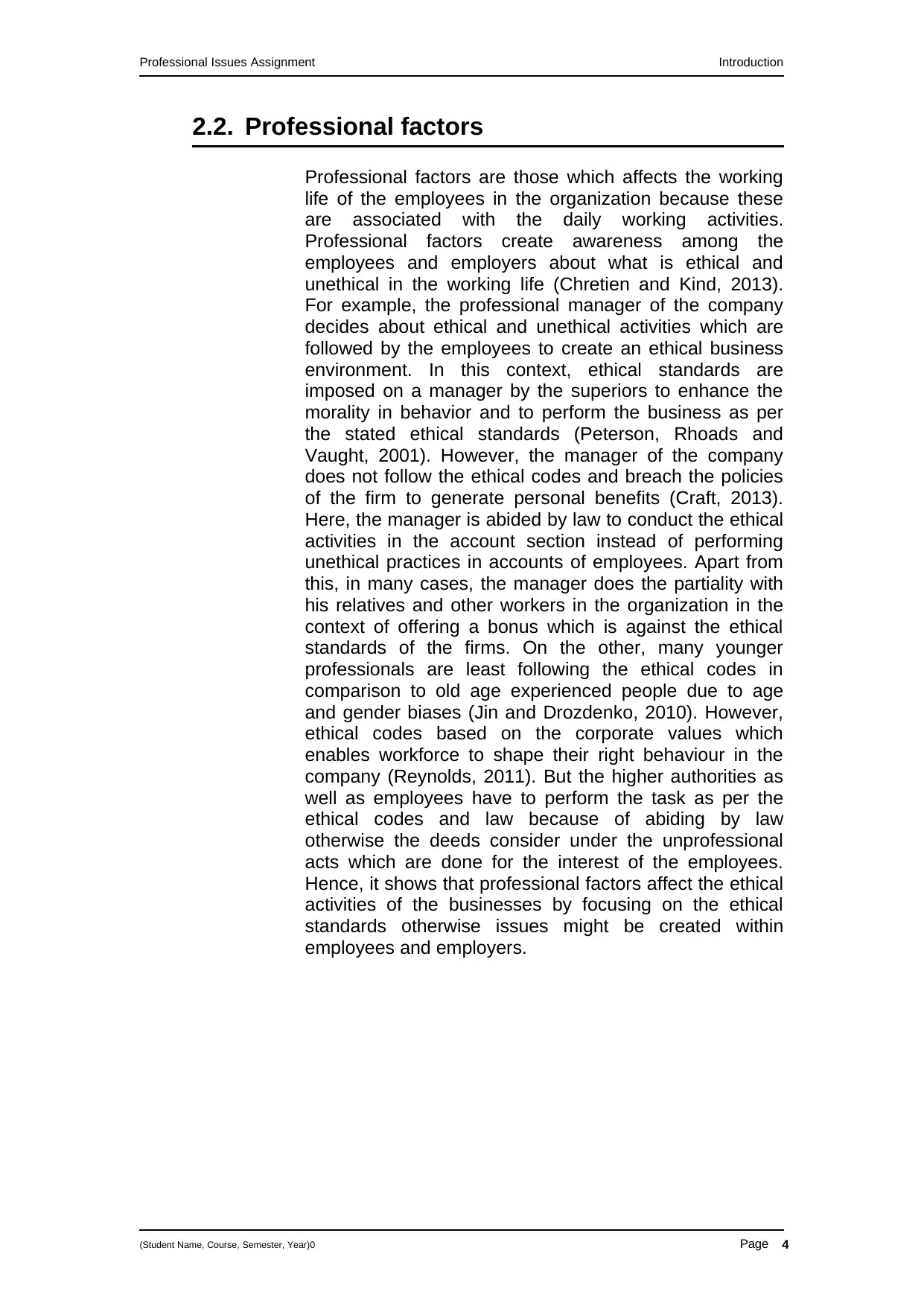
Professional Issues Assignment Introduction
2.2. Professional factors
Professional factors are those which affects the working
life of the employees in the organization because these
are associated with the daily working activities.
Professional factors create awareness among the
employees and employers about what is ethical and
unethical in the working life (Chretien and Kind, 2013).
For example, the professional manager of the company
decides about ethical and unethical activities which are
followed by the employees to create an ethical business
environment. In this context, ethical standards are
imposed on a manager by the superiors to enhance the
morality in behavior and to perform the business as per
the stated ethical standards (Peterson, Rhoads and
Vaught, 2001). However, the manager of the company
does not follow the ethical codes and breach the policies
of the firm to generate personal benefits (Craft, 2013).
Here, the manager is abided by law to conduct the ethical
activities in the account section instead of performing
unethical practices in accounts of employees. Apart from
this, in many cases, the manager does the partiality with
his relatives and other workers in the organization in the
context of offering a bonus which is against the ethical
standards of the firms. On the other, many younger
professionals are least following the ethical codes in
comparison to old age experienced people due to age
and gender biases (Jin and Drozdenko, 2010). However,
ethical codes based on the corporate values which
enables workforce to shape their right behaviour in the
company (Reynolds, 2011). But the higher authorities as
well as employees have to perform the task as per the
ethical codes and law because of abiding by law
otherwise the deeds consider under the unprofessional
acts which are done for the interest of the employees.
Hence, it shows that professional factors affect the ethical
activities of the businesses by focusing on the ethical
standards otherwise issues might be created within
employees and employers.
(Student Name, Course, Semester, Year)0 Page 4
2.2. Professional factors
Professional factors are those which affects the working
life of the employees in the organization because these
are associated with the daily working activities.
Professional factors create awareness among the
employees and employers about what is ethical and
unethical in the working life (Chretien and Kind, 2013).
For example, the professional manager of the company
decides about ethical and unethical activities which are
followed by the employees to create an ethical business
environment. In this context, ethical standards are
imposed on a manager by the superiors to enhance the
morality in behavior and to perform the business as per
the stated ethical standards (Peterson, Rhoads and
Vaught, 2001). However, the manager of the company
does not follow the ethical codes and breach the policies
of the firm to generate personal benefits (Craft, 2013).
Here, the manager is abided by law to conduct the ethical
activities in the account section instead of performing
unethical practices in accounts of employees. Apart from
this, in many cases, the manager does the partiality with
his relatives and other workers in the organization in the
context of offering a bonus which is against the ethical
standards of the firms. On the other, many younger
professionals are least following the ethical codes in
comparison to old age experienced people due to age
and gender biases (Jin and Drozdenko, 2010). However,
ethical codes based on the corporate values which
enables workforce to shape their right behaviour in the
company (Reynolds, 2011). But the higher authorities as
well as employees have to perform the task as per the
ethical codes and law because of abiding by law
otherwise the deeds consider under the unprofessional
acts which are done for the interest of the employees.
Hence, it shows that professional factors affect the ethical
activities of the businesses by focusing on the ethical
standards otherwise issues might be created within
employees and employers.
(Student Name, Course, Semester, Year)0 Page 4
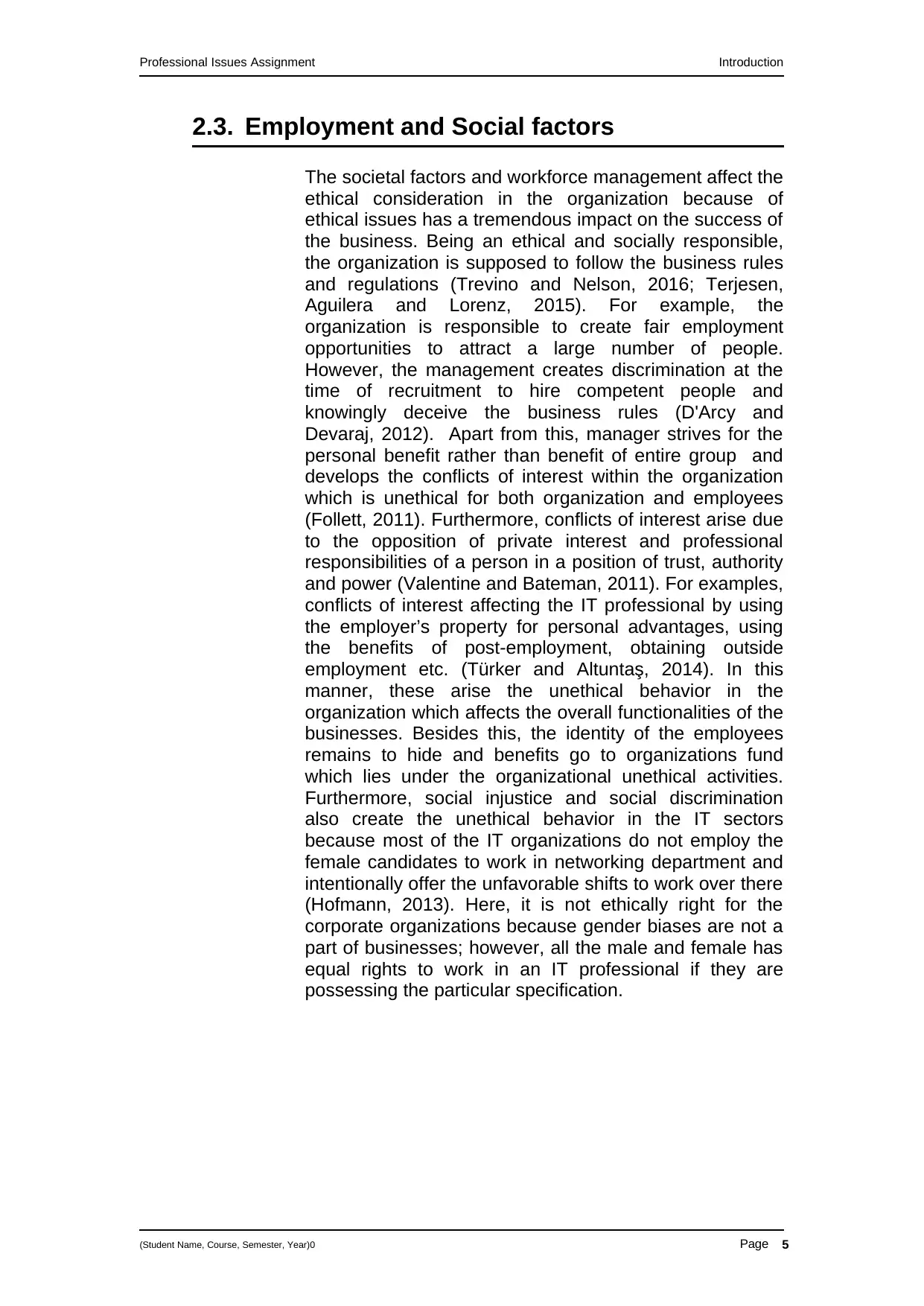
Professional Issues Assignment Introduction
2.3. Employment and Social factors
The societal factors and workforce management affect the
ethical consideration in the organization because of
ethical issues has a tremendous impact on the success of
the business. Being an ethical and socially responsible,
the organization is supposed to follow the business rules
and regulations (Trevino and Nelson, 2016; Terjesen,
Aguilera and Lorenz, 2015). For example, the
organization is responsible to create fair employment
opportunities to attract a large number of people.
However, the management creates discrimination at the
time of recruitment to hire competent people and
knowingly deceive the business rules (D'Arcy and
Devaraj, 2012). Apart from this, manager strives for the
personal benefit rather than benefit of entire group and
develops the conflicts of interest within the organization
which is unethical for both organization and employees
(Follett, 2011). Furthermore, conflicts of interest arise due
to the opposition of private interest and professional
responsibilities of a person in a position of trust, authority
and power (Valentine and Bateman, 2011). For examples,
conflicts of interest affecting the IT professional by using
the employer’s property for personal advantages, using
the benefits of post-employment, obtaining outside
employment etc. (Türker and Altuntaş, 2014). In this
manner, these arise the unethical behavior in the
organization which affects the overall functionalities of the
businesses. Besides this, the identity of the employees
remains to hide and benefits go to organizations fund
which lies under the organizational unethical activities.
Furthermore, social injustice and social discrimination
also create the unethical behavior in the IT sectors
because most of the IT organizations do not employ the
female candidates to work in networking department and
intentionally offer the unfavorable shifts to work over there
(Hofmann, 2013). Here, it is not ethically right for the
corporate organizations because gender biases are not a
part of businesses; however, all the male and female has
equal rights to work in an IT professional if they are
possessing the particular specification.
(Student Name, Course, Semester, Year)0 Page 5
2.3. Employment and Social factors
The societal factors and workforce management affect the
ethical consideration in the organization because of
ethical issues has a tremendous impact on the success of
the business. Being an ethical and socially responsible,
the organization is supposed to follow the business rules
and regulations (Trevino and Nelson, 2016; Terjesen,
Aguilera and Lorenz, 2015). For example, the
organization is responsible to create fair employment
opportunities to attract a large number of people.
However, the management creates discrimination at the
time of recruitment to hire competent people and
knowingly deceive the business rules (D'Arcy and
Devaraj, 2012). Apart from this, manager strives for the
personal benefit rather than benefit of entire group and
develops the conflicts of interest within the organization
which is unethical for both organization and employees
(Follett, 2011). Furthermore, conflicts of interest arise due
to the opposition of private interest and professional
responsibilities of a person in a position of trust, authority
and power (Valentine and Bateman, 2011). For examples,
conflicts of interest affecting the IT professional by using
the employer’s property for personal advantages, using
the benefits of post-employment, obtaining outside
employment etc. (Türker and Altuntaş, 2014). In this
manner, these arise the unethical behavior in the
organization which affects the overall functionalities of the
businesses. Besides this, the identity of the employees
remains to hide and benefits go to organizations fund
which lies under the organizational unethical activities.
Furthermore, social injustice and social discrimination
also create the unethical behavior in the IT sectors
because most of the IT organizations do not employ the
female candidates to work in networking department and
intentionally offer the unfavorable shifts to work over there
(Hofmann, 2013). Here, it is not ethically right for the
corporate organizations because gender biases are not a
part of businesses; however, all the male and female has
equal rights to work in an IT professional if they are
possessing the particular specification.
(Student Name, Course, Semester, Year)0 Page 5
⊘ This is a preview!⊘
Do you want full access?
Subscribe today to unlock all pages.

Trusted by 1+ million students worldwide
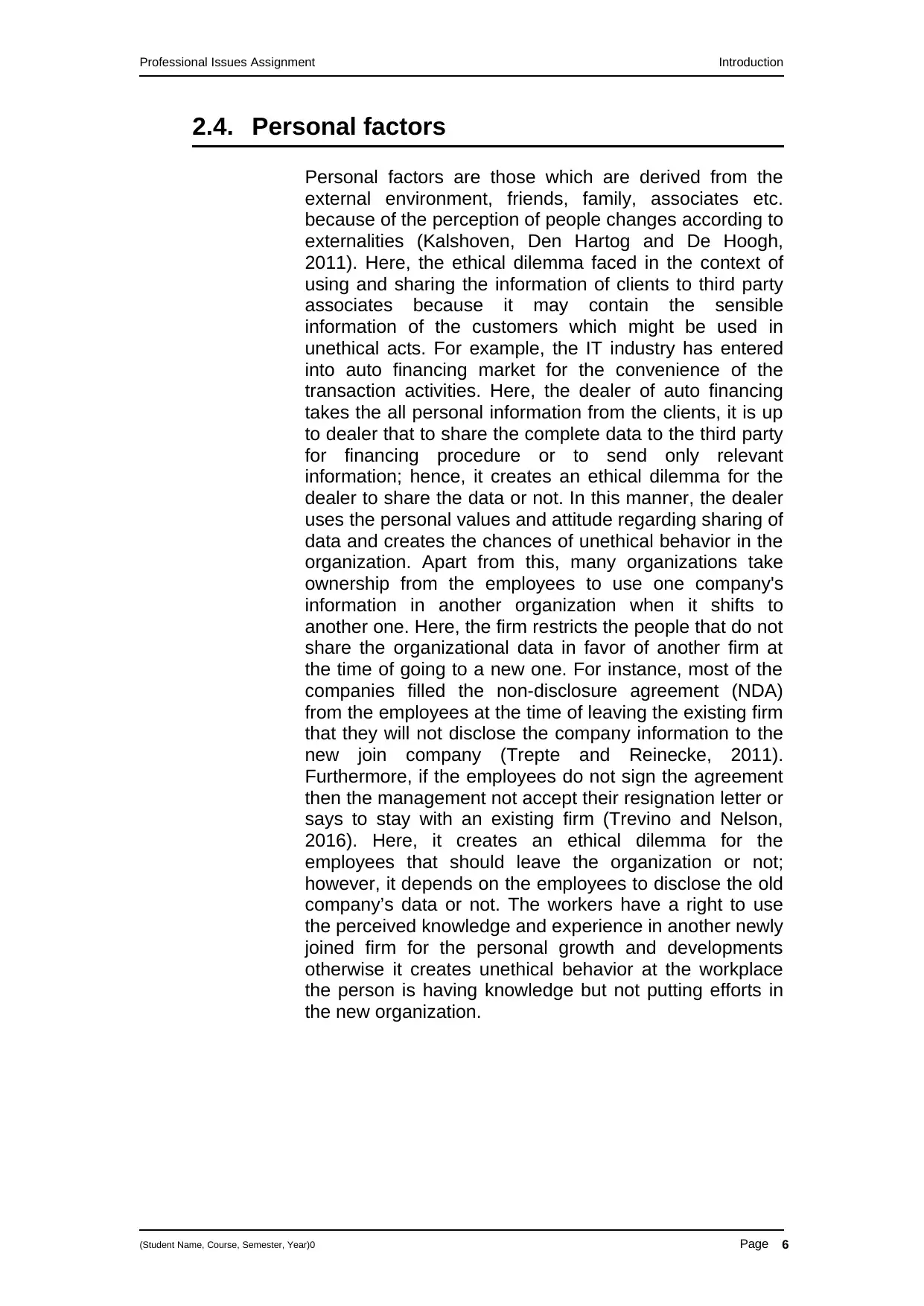
Professional Issues Assignment Introduction
2.4. Personal factors
Personal factors are those which are derived from the
external environment, friends, family, associates etc.
because of the perception of people changes according to
externalities (Kalshoven, Den Hartog and De Hoogh,
2011). Here, the ethical dilemma faced in the context of
using and sharing the information of clients to third party
associates because it may contain the sensible
information of the customers which might be used in
unethical acts. For example, the IT industry has entered
into auto financing market for the convenience of the
transaction activities. Here, the dealer of auto financing
takes the all personal information from the clients, it is up
to dealer that to share the complete data to the third party
for financing procedure or to send only relevant
information; hence, it creates an ethical dilemma for the
dealer to share the data or not. In this manner, the dealer
uses the personal values and attitude regarding sharing of
data and creates the chances of unethical behavior in the
organization. Apart from this, many organizations take
ownership from the employees to use one company's
information in another organization when it shifts to
another one. Here, the firm restricts the people that do not
share the organizational data in favor of another firm at
the time of going to a new one. For instance, most of the
companies filled the non-disclosure agreement (NDA)
from the employees at the time of leaving the existing firm
that they will not disclose the company information to the
new join company (Trepte and Reinecke, 2011).
Furthermore, if the employees do not sign the agreement
then the management not accept their resignation letter or
says to stay with an existing firm (Trevino and Nelson,
2016). Here, it creates an ethical dilemma for the
employees that should leave the organization or not;
however, it depends on the employees to disclose the old
company’s data or not. The workers have a right to use
the perceived knowledge and experience in another newly
joined firm for the personal growth and developments
otherwise it creates unethical behavior at the workplace
the person is having knowledge but not putting efforts in
the new organization.
(Student Name, Course, Semester, Year)0 Page 6
2.4. Personal factors
Personal factors are those which are derived from the
external environment, friends, family, associates etc.
because of the perception of people changes according to
externalities (Kalshoven, Den Hartog and De Hoogh,
2011). Here, the ethical dilemma faced in the context of
using and sharing the information of clients to third party
associates because it may contain the sensible
information of the customers which might be used in
unethical acts. For example, the IT industry has entered
into auto financing market for the convenience of the
transaction activities. Here, the dealer of auto financing
takes the all personal information from the clients, it is up
to dealer that to share the complete data to the third party
for financing procedure or to send only relevant
information; hence, it creates an ethical dilemma for the
dealer to share the data or not. In this manner, the dealer
uses the personal values and attitude regarding sharing of
data and creates the chances of unethical behavior in the
organization. Apart from this, many organizations take
ownership from the employees to use one company's
information in another organization when it shifts to
another one. Here, the firm restricts the people that do not
share the organizational data in favor of another firm at
the time of going to a new one. For instance, most of the
companies filled the non-disclosure agreement (NDA)
from the employees at the time of leaving the existing firm
that they will not disclose the company information to the
new join company (Trepte and Reinecke, 2011).
Furthermore, if the employees do not sign the agreement
then the management not accept their resignation letter or
says to stay with an existing firm (Trevino and Nelson,
2016). Here, it creates an ethical dilemma for the
employees that should leave the organization or not;
however, it depends on the employees to disclose the old
company’s data or not. The workers have a right to use
the perceived knowledge and experience in another newly
joined firm for the personal growth and developments
otherwise it creates unethical behavior at the workplace
the person is having knowledge but not putting efforts in
the new organization.
(Student Name, Course, Semester, Year)0 Page 6
Paraphrase This Document
Need a fresh take? Get an instant paraphrase of this document with our AI Paraphraser
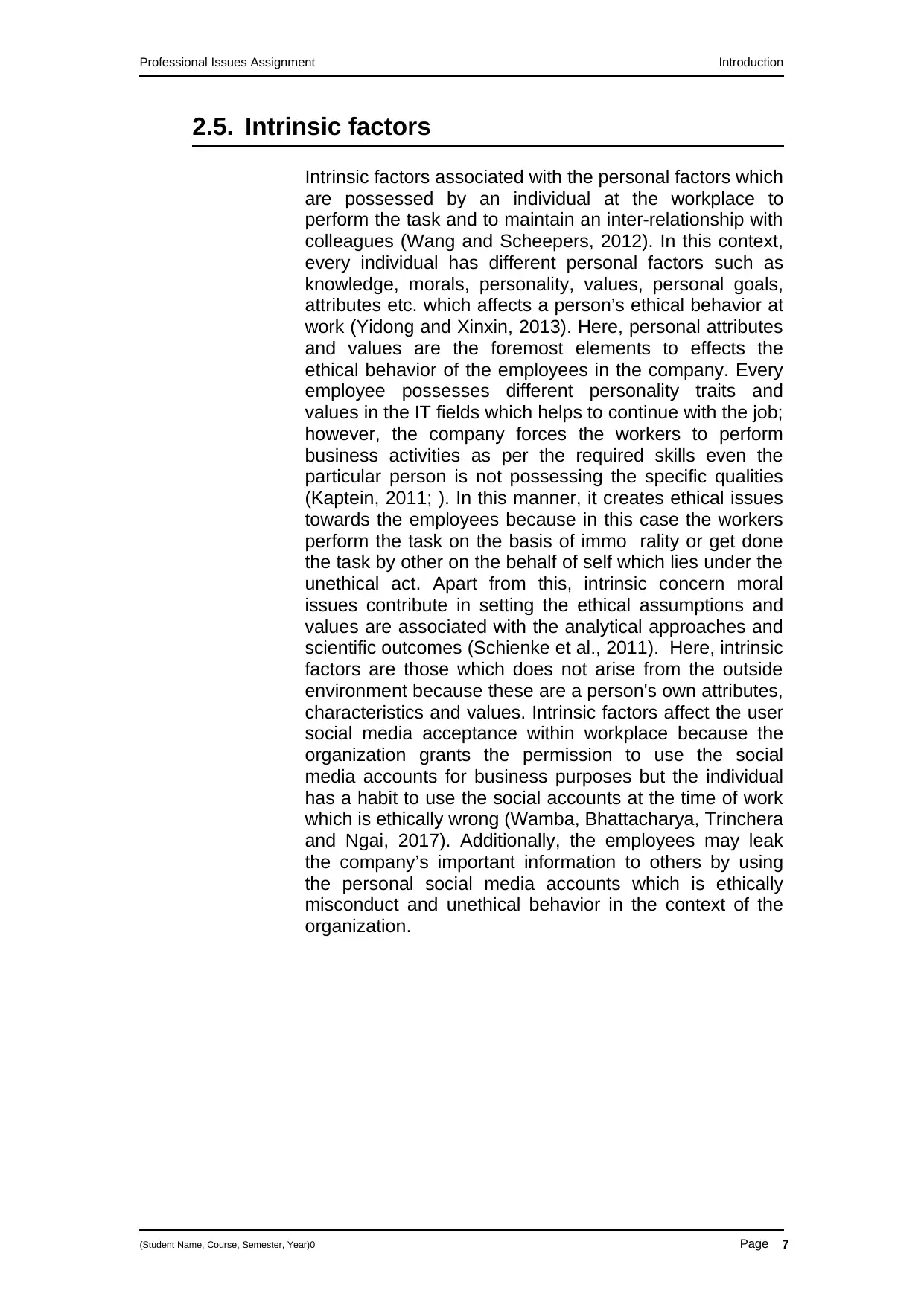
Professional Issues Assignment Introduction
2.5. Intrinsic factors
Intrinsic factors associated with the personal factors which
are possessed by an individual at the workplace to
perform the task and to maintain an inter-relationship with
colleagues (Wang and Scheepers, 2012). In this context,
every individual has different personal factors such as
knowledge, morals, personality, values, personal goals,
attributes etc. which affects a person’s ethical behavior at
work (Yidong and Xinxin, 2013). Here, personal attributes
and values are the foremost elements to effects the
ethical behavior of the employees in the company. Every
employee possesses different personality traits and
values in the IT fields which helps to continue with the job;
however, the company forces the workers to perform
business activities as per the required skills even the
particular person is not possessing the specific qualities
(Kaptein, 2011; ). In this manner, it creates ethical issues
towards the employees because in this case the workers
perform the task on the basis of immo rality or get done
the task by other on the behalf of self which lies under the
unethical act. Apart from this, intrinsic concern moral
issues contribute in setting the ethical assumptions and
values are associated with the analytical approaches and
scientific outcomes (Schienke et al., 2011). Here, intrinsic
factors are those which does not arise from the outside
environment because these are a person's own attributes,
characteristics and values. Intrinsic factors affect the user
social media acceptance within workplace because the
organization grants the permission to use the social
media accounts for business purposes but the individual
has a habit to use the social accounts at the time of work
which is ethically wrong (Wamba, Bhattacharya, Trinchera
and Ngai, 2017). Additionally, the employees may leak
the company’s important information to others by using
the personal social media accounts which is ethically
misconduct and unethical behavior in the context of the
organization.
(Student Name, Course, Semester, Year)0 Page 7
2.5. Intrinsic factors
Intrinsic factors associated with the personal factors which
are possessed by an individual at the workplace to
perform the task and to maintain an inter-relationship with
colleagues (Wang and Scheepers, 2012). In this context,
every individual has different personal factors such as
knowledge, morals, personality, values, personal goals,
attributes etc. which affects a person’s ethical behavior at
work (Yidong and Xinxin, 2013). Here, personal attributes
and values are the foremost elements to effects the
ethical behavior of the employees in the company. Every
employee possesses different personality traits and
values in the IT fields which helps to continue with the job;
however, the company forces the workers to perform
business activities as per the required skills even the
particular person is not possessing the specific qualities
(Kaptein, 2011; ). In this manner, it creates ethical issues
towards the employees because in this case the workers
perform the task on the basis of immo rality or get done
the task by other on the behalf of self which lies under the
unethical act. Apart from this, intrinsic concern moral
issues contribute in setting the ethical assumptions and
values are associated with the analytical approaches and
scientific outcomes (Schienke et al., 2011). Here, intrinsic
factors are those which does not arise from the outside
environment because these are a person's own attributes,
characteristics and values. Intrinsic factors affect the user
social media acceptance within workplace because the
organization grants the permission to use the social
media accounts for business purposes but the individual
has a habit to use the social accounts at the time of work
which is ethically wrong (Wamba, Bhattacharya, Trinchera
and Ngai, 2017). Additionally, the employees may leak
the company’s important information to others by using
the personal social media accounts which is ethically
misconduct and unethical behavior in the context of the
organization.
(Student Name, Course, Semester, Year)0 Page 7
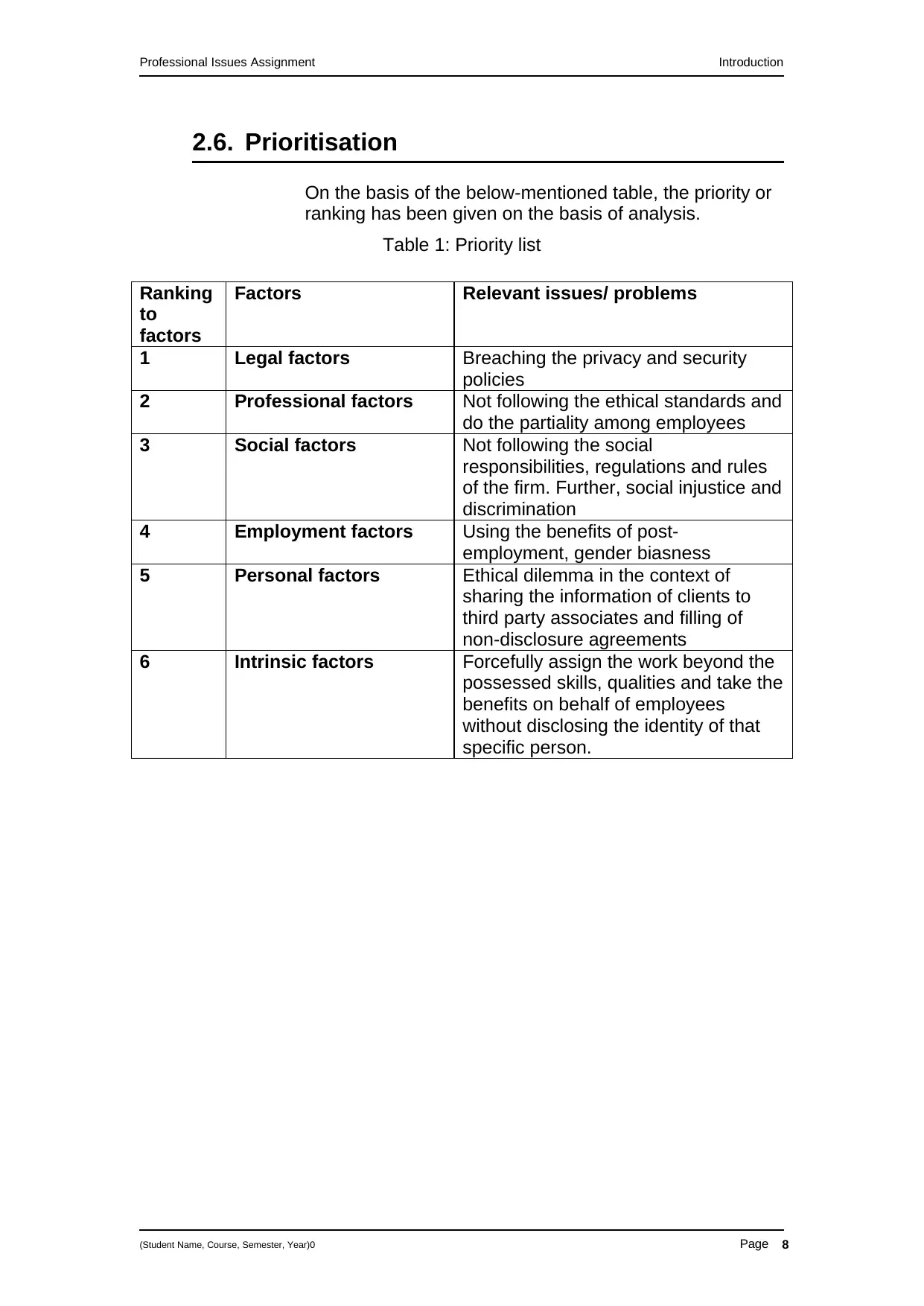
Professional Issues Assignment Introduction
2.6. Prioritisation
On the basis of the below-mentioned table, the priority or
ranking has been given on the basis of analysis.
Table 1: Priority list
Ranking
to
factors
Factors Relevant issues/ problems
1 Legal factors Breaching the privacy and security
policies
2 Professional factors Not following the ethical standards and
do the partiality among employees
3 Social factors Not following the social
responsibilities, regulations and rules
of the firm. Further, social injustice and
discrimination
4 Employment factors Using the benefits of post-
employment, gender biasness
5 Personal factors Ethical dilemma in the context of
sharing the information of clients to
third party associates and filling of
non-disclosure agreements
6 Intrinsic factors Forcefully assign the work beyond the
possessed skills, qualities and take the
benefits on behalf of employees
without disclosing the identity of that
specific person.
(Student Name, Course, Semester, Year)0 Page 8
2.6. Prioritisation
On the basis of the below-mentioned table, the priority or
ranking has been given on the basis of analysis.
Table 1: Priority list
Ranking
to
factors
Factors Relevant issues/ problems
1 Legal factors Breaching the privacy and security
policies
2 Professional factors Not following the ethical standards and
do the partiality among employees
3 Social factors Not following the social
responsibilities, regulations and rules
of the firm. Further, social injustice and
discrimination
4 Employment factors Using the benefits of post-
employment, gender biasness
5 Personal factors Ethical dilemma in the context of
sharing the information of clients to
third party associates and filling of
non-disclosure agreements
6 Intrinsic factors Forcefully assign the work beyond the
possessed skills, qualities and take the
benefits on behalf of employees
without disclosing the identity of that
specific person.
(Student Name, Course, Semester, Year)0 Page 8
⊘ This is a preview!⊘
Do you want full access?
Subscribe today to unlock all pages.

Trusted by 1+ million students worldwide
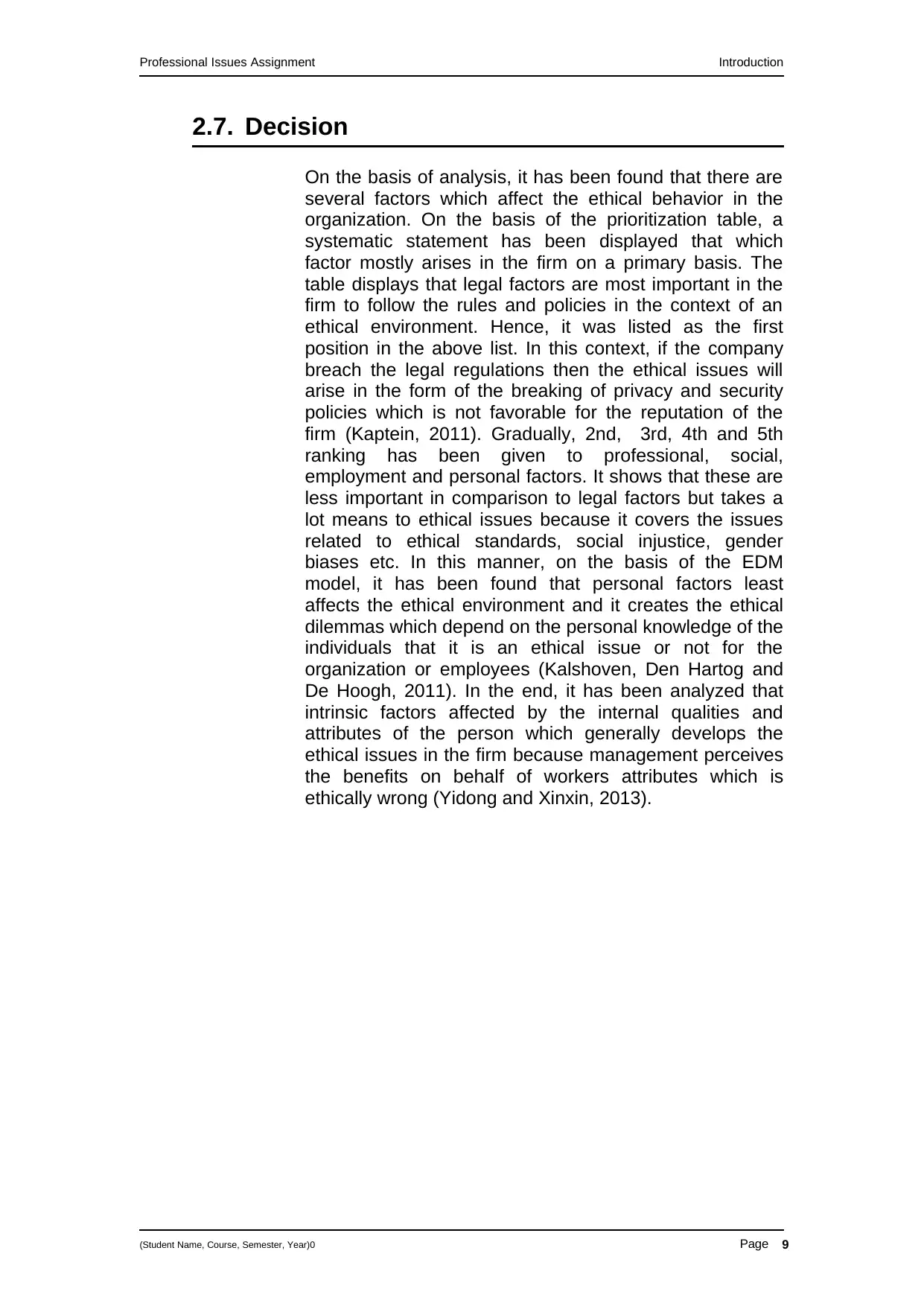
Professional Issues Assignment Introduction
2.7. Decision
On the basis of analysis, it has been found that there are
several factors which affect the ethical behavior in the
organization. On the basis of the prioritization table, a
systematic statement has been displayed that which
factor mostly arises in the firm on a primary basis. The
table displays that legal factors are most important in the
firm to follow the rules and policies in the context of an
ethical environment. Hence, it was listed as the first
position in the above list. In this context, if the company
breach the legal regulations then the ethical issues will
arise in the form of the breaking of privacy and security
policies which is not favorable for the reputation of the
firm (Kaptein, 2011). Gradually, 2nd, 3rd, 4th and 5th
ranking has been given to professional, social,
employment and personal factors. It shows that these are
less important in comparison to legal factors but takes a
lot means to ethical issues because it covers the issues
related to ethical standards, social injustice, gender
biases etc. In this manner, on the basis of the EDM
model, it has been found that personal factors least
affects the ethical environment and it creates the ethical
dilemmas which depend on the personal knowledge of the
individuals that it is an ethical issue or not for the
organization or employees (Kalshoven, Den Hartog and
De Hoogh, 2011). In the end, it has been analyzed that
intrinsic factors affected by the internal qualities and
attributes of the person which generally develops the
ethical issues in the firm because management perceives
the benefits on behalf of workers attributes which is
ethically wrong (Yidong and Xinxin, 2013).
(Student Name, Course, Semester, Year)0 Page 9
2.7. Decision
On the basis of analysis, it has been found that there are
several factors which affect the ethical behavior in the
organization. On the basis of the prioritization table, a
systematic statement has been displayed that which
factor mostly arises in the firm on a primary basis. The
table displays that legal factors are most important in the
firm to follow the rules and policies in the context of an
ethical environment. Hence, it was listed as the first
position in the above list. In this context, if the company
breach the legal regulations then the ethical issues will
arise in the form of the breaking of privacy and security
policies which is not favorable for the reputation of the
firm (Kaptein, 2011). Gradually, 2nd, 3rd, 4th and 5th
ranking has been given to professional, social,
employment and personal factors. It shows that these are
less important in comparison to legal factors but takes a
lot means to ethical issues because it covers the issues
related to ethical standards, social injustice, gender
biases etc. In this manner, on the basis of the EDM
model, it has been found that personal factors least
affects the ethical environment and it creates the ethical
dilemmas which depend on the personal knowledge of the
individuals that it is an ethical issue or not for the
organization or employees (Kalshoven, Den Hartog and
De Hoogh, 2011). In the end, it has been analyzed that
intrinsic factors affected by the internal qualities and
attributes of the person which generally develops the
ethical issues in the firm because management perceives
the benefits on behalf of workers attributes which is
ethically wrong (Yidong and Xinxin, 2013).
(Student Name, Course, Semester, Year)0 Page 9
Paraphrase This Document
Need a fresh take? Get an instant paraphrase of this document with our AI Paraphraser
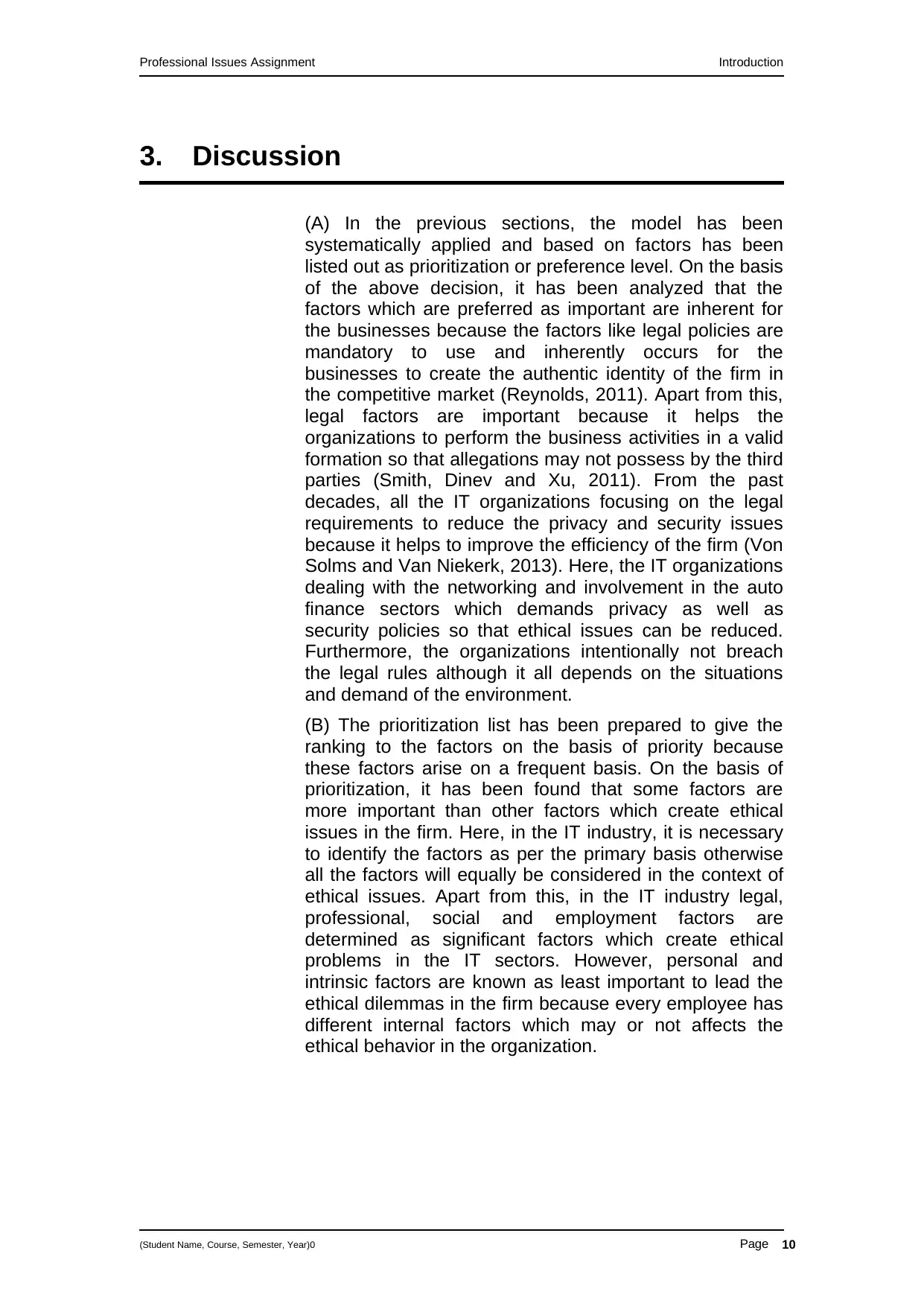
Professional Issues Assignment Introduction
3. Discussion
(A) In the previous sections, the model has been
systematically applied and based on factors has been
listed out as prioritization or preference level. On the basis
of the above decision, it has been analyzed that the
factors which are preferred as important are inherent for
the businesses because the factors like legal policies are
mandatory to use and inherently occurs for the
businesses to create the authentic identity of the firm in
the competitive market (Reynolds, 2011). Apart from this,
legal factors are important because it helps the
organizations to perform the business activities in a valid
formation so that allegations may not possess by the third
parties (Smith, Dinev and Xu, 2011). From the past
decades, all the IT organizations focusing on the legal
requirements to reduce the privacy and security issues
because it helps to improve the efficiency of the firm (Von
Solms and Van Niekerk, 2013). Here, the IT organizations
dealing with the networking and involvement in the auto
finance sectors which demands privacy as well as
security policies so that ethical issues can be reduced.
Furthermore, the organizations intentionally not breach
the legal rules although it all depends on the situations
and demand of the environment.
(B) The prioritization list has been prepared to give the
ranking to the factors on the basis of priority because
these factors arise on a frequent basis. On the basis of
prioritization, it has been found that some factors are
more important than other factors which create ethical
issues in the firm. Here, in the IT industry, it is necessary
to identify the factors as per the primary basis otherwise
all the factors will equally be considered in the context of
ethical issues. Apart from this, in the IT industry legal,
professional, social and employment factors are
determined as significant factors which create ethical
problems in the IT sectors. However, personal and
intrinsic factors are known as least important to lead the
ethical dilemmas in the firm because every employee has
different internal factors which may or not affects the
ethical behavior in the organization.
(Student Name, Course, Semester, Year)0 Page 10
3. Discussion
(A) In the previous sections, the model has been
systematically applied and based on factors has been
listed out as prioritization or preference level. On the basis
of the above decision, it has been analyzed that the
factors which are preferred as important are inherent for
the businesses because the factors like legal policies are
mandatory to use and inherently occurs for the
businesses to create the authentic identity of the firm in
the competitive market (Reynolds, 2011). Apart from this,
legal factors are important because it helps the
organizations to perform the business activities in a valid
formation so that allegations may not possess by the third
parties (Smith, Dinev and Xu, 2011). From the past
decades, all the IT organizations focusing on the legal
requirements to reduce the privacy and security issues
because it helps to improve the efficiency of the firm (Von
Solms and Van Niekerk, 2013). Here, the IT organizations
dealing with the networking and involvement in the auto
finance sectors which demands privacy as well as
security policies so that ethical issues can be reduced.
Furthermore, the organizations intentionally not breach
the legal rules although it all depends on the situations
and demand of the environment.
(B) The prioritization list has been prepared to give the
ranking to the factors on the basis of priority because
these factors arise on a frequent basis. On the basis of
prioritization, it has been found that some factors are
more important than other factors which create ethical
issues in the firm. Here, in the IT industry, it is necessary
to identify the factors as per the primary basis otherwise
all the factors will equally be considered in the context of
ethical issues. Apart from this, in the IT industry legal,
professional, social and employment factors are
determined as significant factors which create ethical
problems in the IT sectors. However, personal and
intrinsic factors are known as least important to lead the
ethical dilemmas in the firm because every employee has
different internal factors which may or not affects the
ethical behavior in the organization.
(Student Name, Course, Semester, Year)0 Page 10
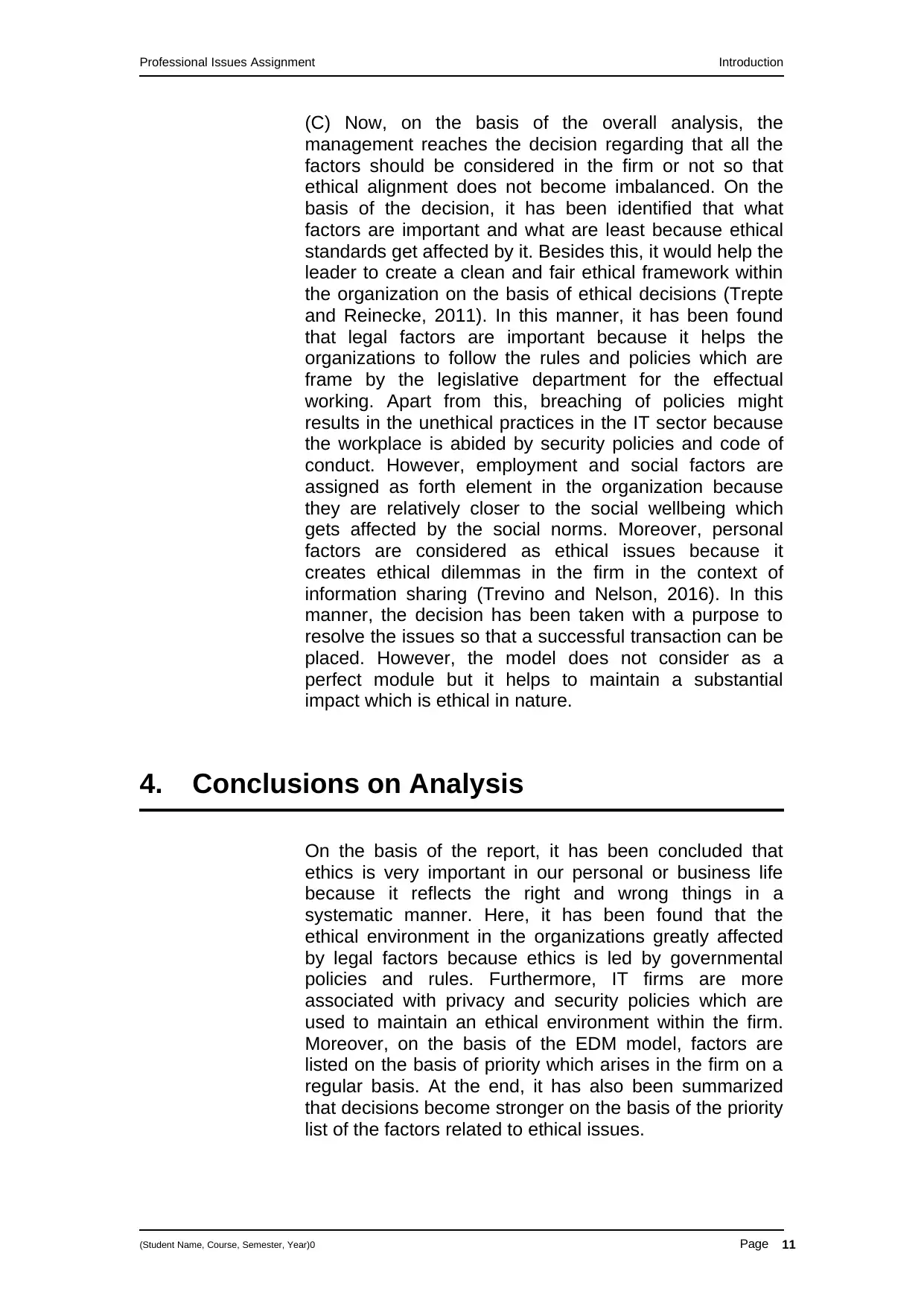
Professional Issues Assignment Introduction
(C) Now, on the basis of the overall analysis, the
management reaches the decision regarding that all the
factors should be considered in the firm or not so that
ethical alignment does not become imbalanced. On the
basis of the decision, it has been identified that what
factors are important and what are least because ethical
standards get affected by it. Besides this, it would help the
leader to create a clean and fair ethical framework within
the organization on the basis of ethical decisions (Trepte
and Reinecke, 2011). In this manner, it has been found
that legal factors are important because it helps the
organizations to follow the rules and policies which are
frame by the legislative department for the effectual
working. Apart from this, breaching of policies might
results in the unethical practices in the IT sector because
the workplace is abided by security policies and code of
conduct. However, employment and social factors are
assigned as forth element in the organization because
they are relatively closer to the social wellbeing which
gets affected by the social norms. Moreover, personal
factors are considered as ethical issues because it
creates ethical dilemmas in the firm in the context of
information sharing (Trevino and Nelson, 2016). In this
manner, the decision has been taken with a purpose to
resolve the issues so that a successful transaction can be
placed. However, the model does not consider as a
perfect module but it helps to maintain a substantial
impact which is ethical in nature.
4. Conclusions on Analysis
On the basis of the report, it has been concluded that
ethics is very important in our personal or business life
because it reflects the right and wrong things in a
systematic manner. Here, it has been found that the
ethical environment in the organizations greatly affected
by legal factors because ethics is led by governmental
policies and rules. Furthermore, IT firms are more
associated with privacy and security policies which are
used to maintain an ethical environment within the firm.
Moreover, on the basis of the EDM model, factors are
listed on the basis of priority which arises in the firm on a
regular basis. At the end, it has also been summarized
that decisions become stronger on the basis of the priority
list of the factors related to ethical issues.
(Student Name, Course, Semester, Year)0 Page 11
(C) Now, on the basis of the overall analysis, the
management reaches the decision regarding that all the
factors should be considered in the firm or not so that
ethical alignment does not become imbalanced. On the
basis of the decision, it has been identified that what
factors are important and what are least because ethical
standards get affected by it. Besides this, it would help the
leader to create a clean and fair ethical framework within
the organization on the basis of ethical decisions (Trepte
and Reinecke, 2011). In this manner, it has been found
that legal factors are important because it helps the
organizations to follow the rules and policies which are
frame by the legislative department for the effectual
working. Apart from this, breaching of policies might
results in the unethical practices in the IT sector because
the workplace is abided by security policies and code of
conduct. However, employment and social factors are
assigned as forth element in the organization because
they are relatively closer to the social wellbeing which
gets affected by the social norms. Moreover, personal
factors are considered as ethical issues because it
creates ethical dilemmas in the firm in the context of
information sharing (Trevino and Nelson, 2016). In this
manner, the decision has been taken with a purpose to
resolve the issues so that a successful transaction can be
placed. However, the model does not consider as a
perfect module but it helps to maintain a substantial
impact which is ethical in nature.
4. Conclusions on Analysis
On the basis of the report, it has been concluded that
ethics is very important in our personal or business life
because it reflects the right and wrong things in a
systematic manner. Here, it has been found that the
ethical environment in the organizations greatly affected
by legal factors because ethics is led by governmental
policies and rules. Furthermore, IT firms are more
associated with privacy and security policies which are
used to maintain an ethical environment within the firm.
Moreover, on the basis of the EDM model, factors are
listed on the basis of priority which arises in the firm on a
regular basis. At the end, it has also been summarized
that decisions become stronger on the basis of the priority
list of the factors related to ethical issues.
(Student Name, Course, Semester, Year)0 Page 11
⊘ This is a preview!⊘
Do you want full access?
Subscribe today to unlock all pages.

Trusted by 1+ million students worldwide
1 out of 20
Related Documents
Your All-in-One AI-Powered Toolkit for Academic Success.
+13062052269
info@desklib.com
Available 24*7 on WhatsApp / Email
![[object Object]](/_next/static/media/star-bottom.7253800d.svg)
Unlock your academic potential
Copyright © 2020–2026 A2Z Services. All Rights Reserved. Developed and managed by ZUCOL.

